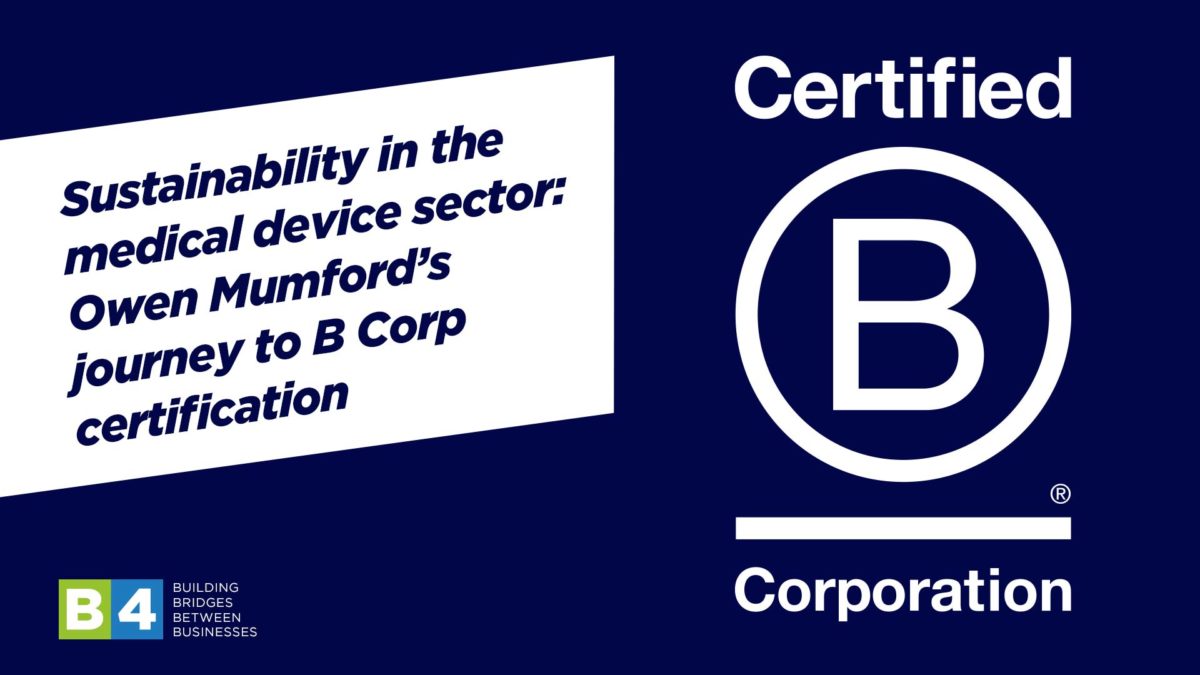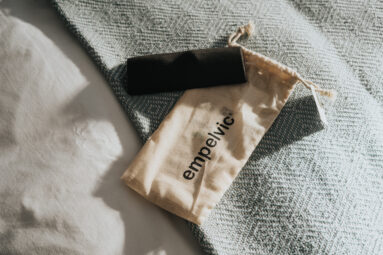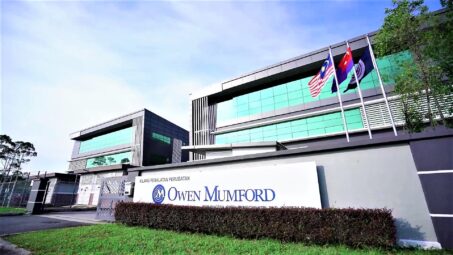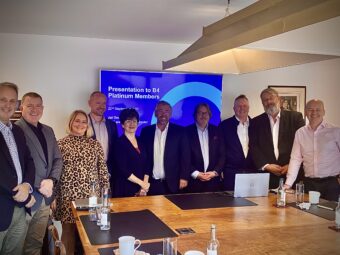
Sustainability in the medical device sector: Owen Mumford’s journey to B Corp certification
Sustainability in the medical sector. Sustainability is no longer a mere buzzword and is now increasingly a mandatory feature in corporate decision-making.
In the healthcare sector, ESG (Environmental-Social-Governance) credentials are becoming a fixture in tenders, pushing the supply chain to review operations and make improvements. In the UK, the National Health Service is aiming to become the world’s first carbon net zero national health system by 2040, and by 2045 this will also extend to the wider supplier chain. With 80,000 suppliers, the NHS can use its purchasing power to make a change across its supply network. The impact could be significant. Medicine, medical equipment and other supply chain sources represent over half of the organisation’s carbon emissions. This focus on the environment is extending to businesses as well, as they look to their own suppliers to boost performance in this area. In short, no business can afford to ignore the question of sustainability, as it may stand to lose out commercially.
In the medical device sector, the need to control contamination can make recycling and reuse complex and costly, in some cases even impossible. There is scope for greater innovation in this area but in the meantime, it is possible to reduce the environmental impact of products by revisiting the whole design and manufacturing process to consider where changes can be made. As a family owned business, at Owen Mumford a sustainable future has for many years been high on our agenda and is deeply rooted across our core values of heritage, safety and sustainability. With the sole purpose of moving forward in this area, we opted for B Corp certification to become our next milestone. The B Corp certification process not only reviews environmental credentials, but also assesses companies in four additional areas of impact: governance, community, workers and customers. Medical device companies like ours already operate in a highly regulated sector, so it made sense for us to also consolidate our ethical and environmental achievements and aspirations with a recognised certification. We are now among the very first medical device companies to become B Corp certified.
The demands of B Corp
The B stands for Benefit. Certified B Corps are a new model for organisations that are proactively tackling some of the most pressing global challenges. In obtaining a B Corp certification, a company officially states that it works for the greater good of the planet and its people. This for us was a natural progression that links to the United Nations Sustainable Development goals (SDGs) we had already chosen to follow. To verify as a B Corp, a company must complete the ‘B Impact Assessment’, including over 250 questions assessing a company’s governing structure, from articles of association to day-to-day operations. Globally, there are currently over 4,000 B Corps in 77 countries and 153 industries, and over 100,000 companies manage their impact with the B Impact Assessment. The B Corp community in the UK, representing a broad cross section of industries and sizes, comprises over 400 companies. In this article, we highlight some of the key steps in our journey to becoming a B Corp.
Achieving certification
Our commitment to our social and environmental responsibilities was formally enshrined in our articles of association, with a new section laying out the company’s purpose. This being in terms of promoting the success of the company for the benefit of all stakeholders, and how we make a material positive impact on society and the environment through our business and operations. This formal pledge will serve to protect our mission and holds us accountable to all our stakeholders.
Before we began the B Corp process, we had already invested time and resources in better understanding issues around sustainability and the resulting actions we can take as a business. In 2014, our Environmental Steering Group was formed to conduct and monitor initiatives that support our corporate sustainability objectives. This demonstrated our existing engagement, and to further strengthen our commitment, we implemented energy reduction initiatives across our global operations, in the UK, USA and Malaysia. This reduced our Scope 1 and 2 carbon emissions by over a quarter (27.3%). Additionally, our UK sites are now predominantly powered by renewable sources, including the energy we generate ourselves via our on-site solar arrays. We also tracked and recorded how we manage waste to show a decline in overall waste generation in relation to sales. Additionally, we extended our environmental purchasing policy throughout our own supply chain network and conducted an analysis of our value chain (including suppliers, services, and materials) to identify material risk of contributions to greenhouse gas emissions.
The other key area was safety. Safety is essential in the design of our medical devices, but this also extends to the way we run our business. For the past two years, our excellent health and safety standards have been recognised with a gold award from the UK’s Royal Society for the Prevention of Accidents. Organisations receiving a RoSPA award are recognised as being world-leaders in health and safety practice. But we knew that yet more could be done. An additional step to achieve the B Corp certification was conducting an air quality audit, since indoor air quality can seriously impact the health, comfort and well-being of building occupants. Carbon dioxide concentration is one of the indicators of adequate ventilation and the consequential indoor air quality. Temperatures, relative humidity and carbon monoxide levels were also monitored, and our premises met the audit thresholds.
Future plans
B Corp is not a “once-and-done” certification. Rather than being a static standard, it is more a tool – a methodology – which helps manage the journey to continually progressing ESG benchmarks. It shows where an organisation stands; it independently certifies starter standards of compliance and it helps mark out the road to future achievements. This is why Owen Mumford chose to take on the B Corp challenge. We believe that the best attitude to ESG compliance is to engage with a system that allows the corporation to regularly and achievably raise the bar. Tough measures of progress are now hardwired into our corporate reporting, offering complete transparency to senior management – and thereby the ability to challenge the business to set targets for continual improvement. It could be said that B Corp reflects the ethos of LEAN manufacturing management, in that both are roadmaps for an ongoing journey, rather than an end in themselves.
Summary
In conclusion, B Corp presents a true challenge to corporations to measure and improve their ESG standards. Rather than a badge to be won and then forgotten, B Corp helps instil, and then govern, a better way of thinking. Every single person in the company has become involved and is helping to move standards forward.
More in Business Strategy

‘Meanwhile in Oxfordshire..’ Case Study: Ducky Zebra, the sustainable kidswear brand...
‘Often girls’ clothes are pink, cute and impractical. They promote kindness, but not always confidence. And boys’ clothes are often blue, aggressive and adventure seeking. They promote confidence, but not always kindness. I wanted to bring these two characteristics together and allow all children, no matter what their gender, to celebrate both kindness and confidence.’ – Sally Dear, Founder of Ducky Zebra

Innovative drone delivery trials take place at Milton Park
A pilot demonstration for a set of innovative drone and electric van freight trials was successfully completed at Milton Park.

Businesses encouraged to have their say: Central Oxfordshire Travel Plan
Oxfordshire County Council has launched its first draft area travel plan for public feedback following the adoption of its county-wide transport and connectivity plan, last month – and the county’s businesses are being encouraged to have their say.
From this author

Owen Mumford acquires Empelvic
Owen Mumford Expands Pelvic Health Portfolio with Acquisition of Empelvic

Owen Mumford partners with Duopharma Biotech to distribute medical devices
Partnership with leading pharmaceutical company will supply diabetes and eye care devices in the Malaysia and Brunei markets

No Time to Stand Still
Owen Mumford CEO Jarl Severn talks about innovation as an enabler of growth

